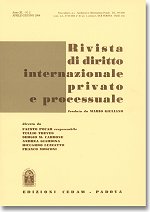Issue 2015.2 Nederlands Internationaal Privaatrecht
The second issue of 2015 of the Dutch journal on Private International Law, Nederlands Internationaal Privaatrecht, includes the following contributions:
- Xandra Kramer, ‘Editorial: Empirical legal studies in private international law’ , p. 195-196.
- S.H. Barten and B.J. van het Kaar, ‘‘Grensverleggend’ derdenbeslag: over de reikwijdte van een Nederlands beslagverlof onder de Herschikking Brussel I’, p. 197-204.
This article deals with the new opportunities that the revised Brussels Regulation (‘Recast’) may offer to claimants who wish to obtain a Dutch pre-judgment garnishee order against garnishees located in other Member States. Under the former Brussels Regulation, the recognition and enforcement of ‘ex parte’ provisional measures in another Member State than that of the courts ordering the measures fell outside the scope of Chapter III Brussels Regulation in accordance with the case law from the European Court of Justice (Denilauler/Couchet). The Recast, in contrast, allows the enforcement of ‘ex parte’ garnishee orders in other Member States, provided the court issuing the order has jurisdiction as to the subject-matter of the proceedings. However, the enforcement of a Dutch ex parte garnishee order in other Member States may give rise to practical difficulties. The Recast requires the ex parte judgment to be served upon the debtor before the enforcement (garnishment) takes place. It may therefore prove to be difficult for claimants to ensure that garnishment will take place only shortly after the garnishee order was served on the debtor in order to prevent the dispersal of funds by the debtor. It is argued that these problems may be solved by good coordination between the competent enforcement authorities of the Member States. However, in all likelihood, successful coordination by the creditor is only possible in the event of a limited number of garnishees involved.
In light of this abolition of impediments at the European level, the article considers whether Dutch national procedural law may restrict courts in the Netherlands from issuing extraterritorial garnishee orders against garnishees who do not have their domicile in the Netherlands. Based on the current guidelines and case law it is to be expected that the Dutch courts will exercise restraint when dealing with a request for an extraterritorial order. It is argued that, although Dutch law does require a certain connection with Dutch territory, the said connection may also be established if the creditor can make a reasonable case that one of the anticipated garnishees has its domicile within the Netherlands and that there are clear indications that the funds will be dispersed. This could, for instance, succeed if the debtor and garnishee are in a close relationship to one another (e.g. a parent company and its subsidiary).
It remains to be seen whether the Dutch courts are willing to issue orders against garnishees outside the Netherlands. If they are, this jurisdiction may soon offer a solution for creditors of Dutch parent companies having claims against their subsidiaries in other Member States. In the Netherlands it is relatively easy to obtain a prejudgment garnishee order. Under the Recast, even EU jurisdictions not familiar with a pre-judgment garnishee order will have to recognize and enforce a Dutch order.
- Miriam Kullmann, ‘Tijdelijke grensoverschrijdende detachering en
gewoonlijk werkland: over de verhouding tussen de Rome I-Verordening en de Detacheringsrichtlijn en de rol van de Handhavingsrichtlijn’, p. 205-216.
The cross-border posting of workers involves the applicability of two EU laws: the Posting of Workers Directive 96/71/EC and the Rome I Regulation. In neither of these legal regulations are the terms ‘temporariness’ and the ‘country in/from which the employee habitually carries out his work’ concretised. This contribution aims at clarifying the meaning of these two terms in both legal regulations in the context of the temporary cross-border posting of workers. Moreover, it assesses the role of the Enforcement Directive, adopted in May 2014, supplementing the Posting of Workers Directive. The new Directive introduces a provision containing criteria by which to identify a ‘genuine posting’. In practice it seemed that often no country where the work was being habitually carried out could be identified. The question then was whether the Posting of Workers Directive would be applicable and what role Articles 8 and 9 Rome I Regulation would play in identifying the applicable law. In addition, the unclear relationship between the Posting of Workers Directive and the Rome I Regulation is analysed.
- Steven Stuij, ‘De wetsontduiking in het ipr: de opleving van een leerstuk?’, p. 217-225.
Recital 26 of the preamble to the EU Regulation (650/2012) on Succession and Wills allows national authorities to suppress evasions of the law by using the doctrine of fraude à la loi. The referral to this doctrine is an interesting development, since the Regulation is the first in a series of EU Regulations in the field of private international law to expressly mention fraude à la loi as a potential corrective mechanism. Besides, this doctrine is rather underdeveloped in Dutch private international law. It will therefore be interesting to analyse this doctrine and to assess its added value in contemporary (EU) private international law. First, several aspects of fraude à la loi will be scrutinised, as well as its acceptance in both Dutch and European private international law. Furthermore, the aforementioned point 26 of the preamble and its rationale will be focused upon. Finally, the relevance of fraude à la loi for contemporary private international law will be observed, with a special emphasis on the Dutch situation.
- E.C.C. Punselie, ‘Verordening wederzijdse erkenning van Beschermingsmaatregelen in burgerlijke zaken’, p. 226-228 (overview article)
In this article an overview is given of Regulation (EU) No. 606/2013 of the European Parliament and of the Council of 12 June 2013 on the mutual recognition of protection measures in civil matters and the way this regulation is implemented in the Netherlands. The Regulation provides for a mechanism by which a person at risk of violence can also rely on a protection measure issued against the person causing this risk in his or her home country – a member state of the European Union – when he or she travels or moves to another member state. For that purpose the protected person can achieve a certificate in the issuing member state with which the protection measure is recognised in another member state without any special procedure being required.
- Pauline Kruiniger, ‘Book presentation: Pauline Kruiniger, Islamic Divorces in Europe: Bridging the Gap between European and Islamic Legal Orders, Eleven International Publishing, The Hague 2015’, p. 229-230.
A Dutch-Moroccan woman has been repudiated in Morocco. She remarries a Moroccan man. Then she moves from the Netherlands to Belgium. Although the preceding repudiation had been recognized in the Netherlands, the Belgian authorities refuse to recognize that repudiation. Consequently she is still seen as being married to her former husband in Belgium and cannot bring her latest husband from Morocco to Belgium. There is discontinuity concerning her personal status and thus a limping legal relationship emerges.

